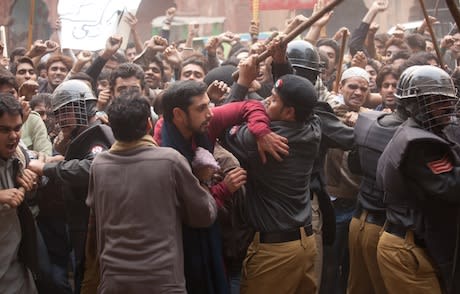Something consistent throughout the works of Mira Nair (a television-calibre director that stumbled into the art house world by tackling "issue" movies) is an indelicate handling of subtly. Save possibly Mississippi Masala, her works have been embarrassingly literal, spelling out any use of metaphor with a broad sensibility, reducing complex issues to single-minded idealism in an almost condescending manner.
As such, it's no surprise that she's tackled Mohsin Hamid's incisive bit of cultural analysis, The Reluctant Fundamentalist, with the sort of speechifying blandness that renders intellectual discussion a moot point. It is, however, a relatively faithful adaptation, as far as plot is concerned, even utilizing the framing device of a sceptical American reporter, Bobby Lincoln (Liev Schreiber), as a vessel to interpret the story of our protagonist, Changez Khan (Riz Ahmed).
From here, protracted flashbacks contextualize the current plight — a kidnapped American academic in Lahore — by sharing the story of Khan from his childhood in the region to his Princeton education, his career on Wall Street and, eventually, his return to Lahore. In structure, these initial sequences are the strongest in the film; in particular, those involving Changez's aggressive, manipulative rise through the corporate hierarchy, utilizing social capital more so brains, aided by his mentor, Jim Cross (Kiefer Sutherland).
More problematic is the inevitable, rather strained love story used as a metaphor for Khan's relationship in a post-9/11 America with emotionally damaged artist Erica (Kate Hudson), a woman unable to interpret present ambivalence without past projections. This relationship, like much of the paralleling of cultural roots versus current geography, is presented anecdotally, with a coldness and deliberateness — his deteriorating relationship with Erica is like that of his failing relationship with America — which leaves it feeling like a cinematic math equation.
While Nair leaves Khan's internal struggle intact, finding assimilating to the American ethos easy initially, only to have it implode and contradict after 9/11 (his very behaviours emulate the sort of greed and entitlement the attacks represent to his birth country), it's her lack of subtlety that renders the film patronizing and slight. All Americans are presented as uniformly single-minded, xenophobic drones, just as the inner-conflict of immigrants in Khan's position is made schematic-like and given a moral slant, simplifying the idea of seeking a life outside of one's own country of birth as a cultural betrayal.
With more grace and tact in tackling a rather complex and moderately involving allegory for geopolitical tensions, Nair could have maintained a text ripe for discussion. But her undergraduate approach to moralizing and making heavy-handed and external any sort of conflict leaves things feeling dirty and mildly ignorant.
(Mongrel Media)As such, it's no surprise that she's tackled Mohsin Hamid's incisive bit of cultural analysis, The Reluctant Fundamentalist, with the sort of speechifying blandness that renders intellectual discussion a moot point. It is, however, a relatively faithful adaptation, as far as plot is concerned, even utilizing the framing device of a sceptical American reporter, Bobby Lincoln (Liev Schreiber), as a vessel to interpret the story of our protagonist, Changez Khan (Riz Ahmed).
From here, protracted flashbacks contextualize the current plight — a kidnapped American academic in Lahore — by sharing the story of Khan from his childhood in the region to his Princeton education, his career on Wall Street and, eventually, his return to Lahore. In structure, these initial sequences are the strongest in the film; in particular, those involving Changez's aggressive, manipulative rise through the corporate hierarchy, utilizing social capital more so brains, aided by his mentor, Jim Cross (Kiefer Sutherland).
More problematic is the inevitable, rather strained love story used as a metaphor for Khan's relationship in a post-9/11 America with emotionally damaged artist Erica (Kate Hudson), a woman unable to interpret present ambivalence without past projections. This relationship, like much of the paralleling of cultural roots versus current geography, is presented anecdotally, with a coldness and deliberateness — his deteriorating relationship with Erica is like that of his failing relationship with America — which leaves it feeling like a cinematic math equation.
While Nair leaves Khan's internal struggle intact, finding assimilating to the American ethos easy initially, only to have it implode and contradict after 9/11 (his very behaviours emulate the sort of greed and entitlement the attacks represent to his birth country), it's her lack of subtlety that renders the film patronizing and slight. All Americans are presented as uniformly single-minded, xenophobic drones, just as the inner-conflict of immigrants in Khan's position is made schematic-like and given a moral slant, simplifying the idea of seeking a life outside of one's own country of birth as a cultural betrayal.
With more grace and tact in tackling a rather complex and moderately involving allegory for geopolitical tensions, Nair could have maintained a text ripe for discussion. But her undergraduate approach to moralizing and making heavy-handed and external any sort of conflict leaves things feeling dirty and mildly ignorant.
